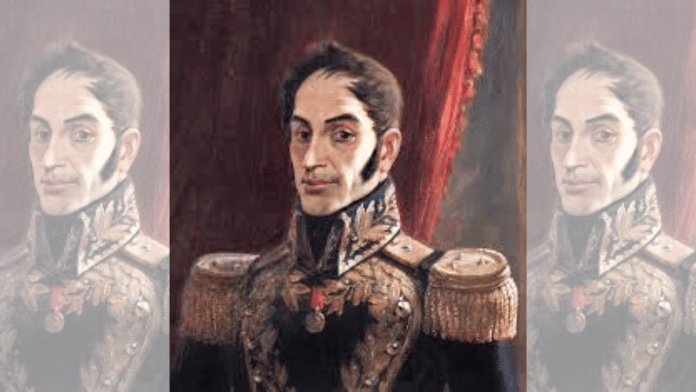New Delhi: Amid a diplomatic stand-off between Colombia and the United States, Colombian President Gustavo Petro, on Monday, invoked the spirit of Simon Bolivar, the revered Latin American independence leader, in a fiery retort to US President Donald Trump.
In the aftermath of escalating tensions over Colombia’s refusal to accept US deportation flights carrying migrants, Petro wrote, “You will kill me, but I will survive in my town, which came before yours, in the Americas…. You will never rule us. The warrior who rode our lands, shouting freedom, who is called Bolivar, opposes you.”
Petro’s response came after Trump threatened tariffs and sanctions on Colombia to punish the Latin American country for refusing to accept military flights carrying deportees as part of his sweeping immigration crackdown in the US.
But late Sunday, the White House said Colombia had agreed to accept the deportees and that its penalties were on hold.
The reference to Bolivar in Petro’s long post was not just a rhetorical flourish. It underscored deeper historical and geopolitical currents between Latin America and the United States—rooted in a long struggle for sovereignty and the rejection of imperial control. With Bolivar becoming the symbolic figurehead in Petro’s diatribe, ThePrint looks at who Simon Bolivar was and his legacy.
Also Read: Trump’s return—US media scrambled for words, Indian TV news divided between fear & fascination
Latin America’s ‘liberator’
Simon Bolívar, born in 1783 in Venezuela, is often referred to as Latin America’s “liberator” for his role in the independence movements of multiple nations—Venezuela, Colombia, Ecuador, Peru, and Bolivia.
Bolivia is even named after him. Petro’s rhetoric tapped into Bolívar’s spirit of defiance against colonialism and external interference, highlighting the region’s history of struggle against imperialism.
Petro also declared that Trump’s threats did not “scare” him and vowed to “resist”. He emphasised that his country no longer looks to the North for guidance and proposed a collective response from both the Americas and the global community if Trump sought to “overthrow” him as Colombia’s president.
‘Liberty, equality, sovereignty’
Bolívar sought to build a new political order for Latin America—one rooted in liberty, equality, and sovereignty—but his vision was tempered by the harsh realities of a region divided by class, race, and entrenched power structures.
In his book on Bolivar, professor and author John Lynch wrote that the leader’s intellectual journey took him to Europe, where he was influenced by thinkers, such as Montesquieu and Rousseau. Yet, his vision was not to mimic European models of governance but to adapt them to Latin America’s unique context. His ideal was an America freed from European domination, so the region could flourish under its own rule.
Bolívar’s ideals often clashed with the realities of post-colonial Latin America. As he fought for independence, he faced the difficulty of uniting a fragmented region. His vision of a unified Latin America—a continent bound by shared values and mutual defence—was never fully realised. In 1830, the year Bolívar died, his dream of a federated “Greater Colombia” collapsed, splintering into independent nations.
Bolivar’s contradictions are central to his legacy. While he advocated for democracy and equality, his political career was marked by his struggle to balance these ideals with the need for stability and order in a region riven by internal divisions. Bolívar famously said, “Only the majority is sovereign”, yet his authoritarian streak came to the fore as he sought to impose order in a fractured continent. His attempts to create a constitution for the fledgling nations of Latin America were often met with resistance, and his ideal of a continental federation was met with both political and social obstacles.
This tension between Bolivar’s lofty ideals and the pragmatic need for governance is a central theme in how modern Latin American leaders, like Petro, draw on his legacy. Bolivar’s vision was not just about independence from Spain but about the creation of a new political and social order—a vision that remains relevant today as Latin America continues to wrestle with issues of sovereignty, inequality, and foreign intervention.
In Petro’s rhetoric, Bolívar serves as a symbol of resistance against imperialism, invoking the historical memory of Latin America’s struggles against foreign domination.
The Colombian president’s clash with the United States over deportation flights is part of a larger geopolitical battle where Latin American nations assert their sovereignty in the face of US influence. Petro’s invocation of Bolívar also reflects a broader rejection of what many in Latin America see as the continuing legacy of US imperialism.
The Colombian president’s words also resonate in the context of modern geopolitical shifts. Countries like Venezuela, under former president Hugo Chávez, have revived Bolívar’s rhetoric in their own struggles against US influence. Chávez, in particular, embraced Bolívar’s vision of a united Latin America and often took his name to justify regional integration initiatives such as the Bolivarian Alliance for the Peoples of Our America (ALBA).
The agreement was proposed by the Venezuelan government under Hugo Chávez as an alternative to the Free Trade Area of the Americas (FTAA or ALCA in Spanish), a pact initially proposed by the United States but which ultimately never came to fruition.
Colonialism and the Indian connect
India has seen similarities between Bolívar’s fight for liberation and their own anti-colonial struggles, as symbolised in the 2019 inauguration of Simón Bolívar Square in New Delhi.
In 2019, Indian President Ram Nath Kovind drew a parallel between Bolívar and Mahatma Gandhi, pointing out that both represented the aspiration for freedom from colonial oppression and the quest for national identity.
Venezuelan ambassador Augusto Montiel said on the square’s inauguration: “The Simon Bolivar Square stands for the strategic fraternal ties between India and Venezuela. It also underlines that the memory of Simon Bolivar will continue to guide between India and those countries that he liberated in Latin America.”
(Edited by Tikli Basu)
Also Read: Watch CutTheClutter: Can the Alien Enemies Act of 1798 empower Trump to deport ‘illegal’ immigrants






